Поиск по материалам: |
Главная → Хроника событий ↔ INFO ENGLISH
Does the institution of twinning between foreign and Russian cities have a future?
Рубрика: INFO ENGLISH
Автор публикации: Российское информационное агентство «Национальный альянс»

Опубликовано: 18/07/2022 18:53
Does the institution of twinning between foreign and Russian cities have a future?
Soviet people had to fight against fascism during World War II. The Great Patriotic War left a huge mark on every family. For a long time, at any feast, the toast for world peace was necessarily raised.
Russia paid more than anyone else with the lives of its sons for peace, so the echo of the war still beats in the hearts of the Russians like the ashes of Klaas.
In Soviet times camaraderie and mutual assistance were the basis of social interaction, shaping the personal values of citizens. On this basis, the phenomenon of friendship between peoples in the form of twin cities developed. The public institute of "twin-cities", supported by the Soviet authorities, spread not only in the territories of the fraternal Soviet republics, became a significant factor in the establishment of international relations after the end of the "Cold War". A twin is someone who became a relative not by blood, but by going through trials together with a named brother.
The Soviet Union disappeared from the world map, but remained in peoples memory. The theme of friendship between peoples developed by inertia - the twinning of cities continued to work, even acquiring new scales and nuances. Sanctions against Russia, imposed by the West, led to a revision of relations on the platform of twinning. In a number of countries they are threatened and under pressure from politicians, some of them have been terminated or suspended.
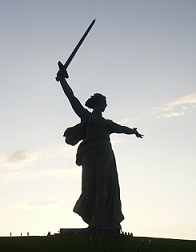 For example, the friendship between Soviet Stalingrad (now Volgograd) and British Coventry was suspended. This is a unique page of world history. The holy battle against fascism marked the beginning of the first twinning of cities of countries with different ideologies. It was a vivid example that showed how communications could develop at the public level.
For example, the friendship between Soviet Stalingrad (now Volgograd) and British Coventry was suspended. This is a unique page of world history. The holy battle against fascism marked the beginning of the first twinning of cities of countries with different ideologies. It was a vivid example that showed how communications could develop at the public level.
The Battle of Stalingrad is a turning point in the Great Patriotic War. It was also the starting point for the establishment of the international twin-cities movement.
A little historical background. The Battle of Stalingrad lasted from July 17, 1942 to February 2, 1943. In October 1942 Stalingrad residents were supported by the British city of Coventry. They had felt the horror of war earlier. On November 14, 1940, the Luftwaffe planes raked the city for 11 hours. The raids continued until August 1942. The British understood what fascism was in action, so they felt sympathy for the Soviet citizens. In November 1941 an Anglo-Soviet Unity Committee was formed in Britain, and in June 1942, when the Battle of Stalingrad began, an Anglo-Soviet Week of Solidarity was held in Coventry. The Lord Mayor of Coventry at the time was Emily Smith. Her granddaughter Margarets recollections are in the Guardian newspaper, which says that it was the British Communists who insisted on opening a Second Front at that time.
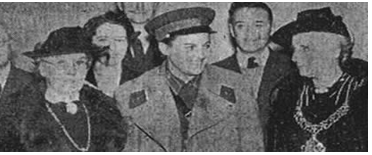 In 1942, the delegation of the Soviet Unions sniper Lyudmila Pavlichenko, a Hero of the Soviet Union, arrives in Great Britain. There is a note about it in the Coventry Evening Telegraph of November 21, 1942. It reads, "Red Army sniper Lieutenant Ludmila Pavlichenko with the Mayor of Coventry (City Council woman Mrs. Smith) and the Mayor (Council woman Mrs. Kant) at Central Hall in November 1942. Residents of 307 towns and villages raised £4,516 for mobile X-ray machines for the Soviet Army and the check was presented to the peace ambassador. In 1943, 830 Coventry residents made a tablecloth on which their names were embroidered with the inscription - "A little help is better than a lot of sympathy." The tablecloth is preserved in the Panorama Museum of the Battle of Stalingrad.
In 1942, the delegation of the Soviet Unions sniper Lyudmila Pavlichenko, a Hero of the Soviet Union, arrives in Great Britain. There is a note about it in the Coventry Evening Telegraph of November 21, 1942. It reads, "Red Army sniper Lieutenant Ludmila Pavlichenko with the Mayor of Coventry (City Council woman Mrs. Smith) and the Mayor (Council woman Mrs. Kant) at Central Hall in November 1942. Residents of 307 towns and villages raised £4,516 for mobile X-ray machines for the Soviet Army and the check was presented to the peace ambassador. In 1943, 830 Coventry residents made a tablecloth on which their names were embroidered with the inscription - "A little help is better than a lot of sympathy." The tablecloth is preserved in the Panorama Museum of the Battle of Stalingrad.
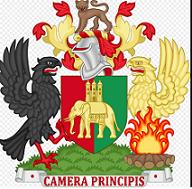 In 1944 the Lord Mayor of Coventry was George Hodgkinson. He wrote a letter to Stalingrad, offering "ties of friendship" that "would find expression in such matters as mutual cooperation." In Soviet times, these contacts were actively developed. And the relations continued in modern Russia.
In 1944 the Lord Mayor of Coventry was George Hodgkinson. He wrote a letter to Stalingrad, offering "ties of friendship" that "would find expression in such matters as mutual cooperation." In Soviet times, these contacts were actively developed. And the relations continued in modern Russia.
In 2008 Volgograd residents made a "Stalingrad tablecloth" for the residents of Coventry, on which they embroidered the words "From forever grateful Stalingrad - Volgograd in commemoration of the 65th anniversary of unique friendship."
In 2018, the International Forum of Public Diplomacy "Dialogue on the Volga: Peace and Mutual Understanding in the XXI Century" was held in Volgograd.
In 2020, British citizen (formerly Volgograd citizen) Olga Lawson (Igumnova) had the idea to create a Forum of sister cities of Great Britain and Russia. Actions were planned with the twin cities of Russia and Great Britain (Cheltenham and Sochi, Coventry and Volgograd, Durham and Kostroma, Exeter and Yaroslavl, Canterbury and Vladimir, Manchester and St. Petersburg, Moscow and London, Plymouth and Novorossiysk, Southampton and Kaliningrad, Oxford and Perm, Perth and Pskov). Covid -19 made changes in the plans but communication was conducted in a digital format. Olga Lawson contributed greatly to the development of the twinning movement between the cities of Great Britain and Russia.
 In The Midland Daily Telegraph (23.09.2021) Ram Lakha, chairman of the Coventry International Friendship Association, said: "It is wonderful to see the pioneering initiative of the compassionate women of Coventry eighty years ago to be turned into a worldwide movement. We thank our sister cities, and congratulate the local, regional and international project initiators who continue to promote friendship without borders."
In The Midland Daily Telegraph (23.09.2021) Ram Lakha, chairman of the Coventry International Friendship Association, said: "It is wonderful to see the pioneering initiative of the compassionate women of Coventry eighty years ago to be turned into a worldwide movement. We thank our sister cities, and congratulate the local, regional and international project initiators who continue to promote friendship without borders."
On 05.10.2021 a video conference "Twin Cities Round Table" was held in Coventry. In 2021, the initiative group "Ties of Friendship" created the "Twin To Win" Peace Prize (the idea for the award was voiced by a delegation from Coventry at the forum in Volgograd in 2018) and the "Twin To Win Awards" appeared .
On 06.10.2021 in Coventry, the Twin To Win commemorative sign and certificate were presented to Peter Barker (a member committee of the Exeter –Yaroslavl Friendship Association). The event was attended by the Russian Ambassador to Great Britain Vladimir Kelin, Deputy Leader of Coventry City Council Abdul Salam Khan, and representatives of the media.
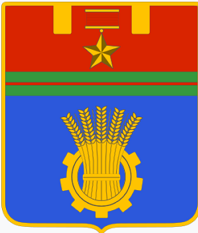 In 2020 an exhibition entitled ‘Stalingrad in British History’ was held in Volgograd, and in 2021 it was opened in Coventry, which was symbolic as it was the year when Coventry was declared the UK City of Culture.
In 2020 an exhibition entitled ‘Stalingrad in British History’ was held in Volgograd, and in 2021 it was opened in Coventry, which was symbolic as it was the year when Coventry was declared the UK City of Culture.
On October 29, 2021 an international round table was held on the theme "Volgograd - Coventry, the History of Twinning and Modern Life". An official delegation from Coventry came to Volgograd to visit the Panorama Museum of the Battle of Stalingrad and Mamaev Kurgan.
On 31.10.2021 an international online forum of peoples diplomacy "Citizens to Citizens" took place in Volgograd. The participants - representatives of Great Britain, Israel, Portugal, Italy and Turkey signed the Twin Cities Memorandum on future cooperation.
On 01.11.2021 for the first time in the history of twinning a round table "Childrens Diplomacy. New Vision" took place in Volgograd. Children from Volgograd, Sevastopol, Coventry and its twin-towns Dijon (France) and Turin (Italy) talked about friendship of children from different countries.
On 17.11.2021 in Coventry there was a discussion about the future of the twin cities and a new concept of work. On November, 23.11.2021 in Volgograd there was a forum of public diplomacy "Dialogue on the Volga" where they also spoke about the prospects of twinning.
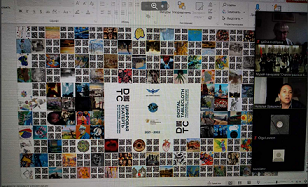 At the beginning of 2022 the final discussion of the project "Digital Tablecloth Volgograd-Coventry - 80 Years of Mutual Support" was held. Unfortunately, at that time Coventry representatives did not actively participate in the discussion. But they sent in drawings and photos for the contest on the topics "What makes your city home?" and "What is your home for you?" More than 300 children and adults participated in the contest and all of them were awarded certificates. All entries were digitized and placed on a huge canvas, “the Digital Tablecloth”. Originally there was a plan that it would "travel" through the cities of Russia and Great Britain in 2022. But the political situation changed and the tablecloth was transferred to the Panorama Museum of "The Battle of Stalingrad".
At the beginning of 2022 the final discussion of the project "Digital Tablecloth Volgograd-Coventry - 80 Years of Mutual Support" was held. Unfortunately, at that time Coventry representatives did not actively participate in the discussion. But they sent in drawings and photos for the contest on the topics "What makes your city home?" and "What is your home for you?" More than 300 children and adults participated in the contest and all of them were awarded certificates. All entries were digitized and placed on a huge canvas, “the Digital Tablecloth”. Originally there was a plan that it would "travel" through the cities of Russia and Great Britain in 2022. But the political situation changed and the tablecloth was transferred to the Panorama Museum of "The Battle of Stalingrad".
Why did activists, who had experienced decades of cooperation with like-minded Russians under their belt, fall for British Russophobe politicians? In the Soviet times the countries were divided by ideology, but there was an understanding of something more important in peoples lives that united them: to keep on peace in the world. Now the picture is different. Why did they so easily let everything go, which was, as they say, dear to them, in which many efforts of several generations were invested? As we know, the Ukrainian diaspora in Britain influenced the decision to suspend the twinning relationship.
 We hope that the twinning has not outlived its importance. We hope that previously launched international projects in Russia and foreign friendship societies continue. In this respect the ‘Yaroslavl-Exeter Friendship Society ‘ is indicative. In 1989 an agreement on establishment of sister-cities relations was signed by the mayors of Yaroslavl and Exeter and in the same year this society was established. At the origins of its creation were teachers. The first chairman was N.P. Voronin, Rector of the K.D. Ushinsky Yaroslavl Pedagogical Institute (previously he was the second secretary of the Yaroslavl regional party committee, who was responsible for ideology), then later T.I. Kasatkina, Head of the department of the English philology of the same Institute, then A. B. Poletaeva, a teacher of the Demidov University. Since 2010 the society has been headed by I. A. Peneva, a teacher of English at school No.4.
We hope that the twinning has not outlived its importance. We hope that previously launched international projects in Russia and foreign friendship societies continue. In this respect the ‘Yaroslavl-Exeter Friendship Society ‘ is indicative. In 1989 an agreement on establishment of sister-cities relations was signed by the mayors of Yaroslavl and Exeter and in the same year this society was established. At the origins of its creation were teachers. The first chairman was N.P. Voronin, Rector of the K.D. Ushinsky Yaroslavl Pedagogical Institute (previously he was the second secretary of the Yaroslavl regional party committee, who was responsible for ideology), then later T.I. Kasatkina, Head of the department of the English philology of the same Institute, then A. B. Poletaeva, a teacher of the Demidov University. Since 2010 the society has been headed by I. A. Peneva, a teacher of English at school No.4.
G.A. Evstifeeva, former Deputy Headmaster and the Director of the teaching of English at school № 4, and now a member of the public council under the Commissioner for Childrens Rights in the Yaroslavl Region, a member of the Board of trustees of the orphanage "Solnechny", a volunteer of the All-Russian public organization "Osteorus" has been a long-time member of the organization. For her many years’ development of people’s diplomacy the teacher was awarded the State Award of the Russian Federation "Order of Friendship".
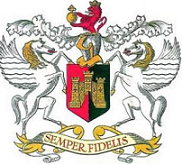 For more than 30 years the twinning organization has been successfully implementing cultural and educational exchange programmes. Teachers from Great Britain (Patricia and Roger Cockrell) contributed a lot to the opening of the first hospices in the Yaroslavl Region in the settlements of Kurba and Dievo Gorodishche. Adults and children came from Exeter to provide volunteer assistance to these hospices.
For more than 30 years the twinning organization has been successfully implementing cultural and educational exchange programmes. Teachers from Great Britain (Patricia and Roger Cockrell) contributed a lot to the opening of the first hospices in the Yaroslavl Region in the settlements of Kurba and Dievo Gorodishche. Adults and children came from Exeter to provide volunteer assistance to these hospices.
The visiting card of the Friendship Society is the competition of creative works related to the culture of Russia and Great Britain, which has been conducted for 25 years among the schoolchildren and college students of the Yaroslavl Region. For the last two years Exeter College students have taken part in it. Each year the themes of the competition were different. For example, once the theme was the following - "A letter to President Putin, a letter to Queen Elizabeth. The students works were sent to Buckingham Palace and the children received a reply from the Queen thanking them for their participation in the contest. In 2020, for the first time, students from one of Exeters colleges took part in the competition. In May 2022 the results of the essay contest "The most interesting event in the life of my home town" were summed up. For the English participants the topic was "The most interesting event in the life of the twin-city of Yaroslavl". The English students devoted their creative works to the first woman cosmonaut Valentina Tereshkova, a native of Yaroslavl and now a Russian State Duma deputy.
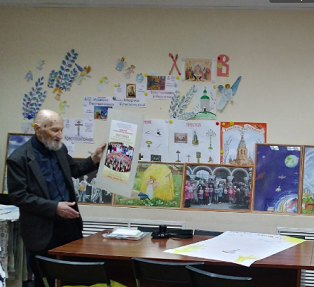 During the years of activity there were other useful things to do, but the main thing is that there were many supporters of new Russia, who came to the country and discovered it for themselves, brought new ideas, and when they came back, they became friends of Russia and conductors of friendship between peoples. Now the relationship with Yaroslavl on the part of Exeter City Council has been suspended under pressure from London. But the citizens of the two countries continue to communicate via messenger chats.
During the years of activity there were other useful things to do, but the main thing is that there were many supporters of new Russia, who came to the country and discovered it for themselves, brought new ideas, and when they came back, they became friends of Russia and conductors of friendship between peoples. Now the relationship with Yaroslavl on the part of Exeter City Council has been suspended under pressure from London. But the citizens of the two countries continue to communicate via messenger chats.
Recently the news came that Peter Barker, one of the active participants of the Exeter-Yaroslavl Twinning Association , who made balanced decisions in the activities of the twinning, had died suddenly. What the societys activities will be like now is difficult to predict.
But life goes on, and it will soon put everything in its place. There are many countries and cities in the world, and it is possible that new ideas for productive (economic or cultural) partnerships with countries in the Asia-Pacific region, for example, will emerge.
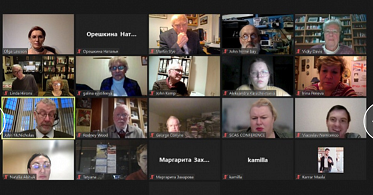 The question remains - will there be a place in the new world order for the institution of twinning, which was built on the principle of "world peace"? If this concept is obsolete, what will replace it? Can the public again enter a new period of history with dignity, if the level of the politicians who stand behind them, for example, in Britain does not meet the challenges of our time. This brings to mind a historical fact that characterizes the level of British diplomatic officials. For example, the political gesture made by King George VI is remembered. In 1943
The question remains - will there be a place in the new world order for the institution of twinning, which was built on the principle of "world peace"? If this concept is obsolete, what will replace it? Can the public again enter a new period of history with dignity, if the level of the politicians who stand behind them, for example, in Britain does not meet the challenges of our time. This brings to mind a historical fact that characterizes the level of British diplomatic officials. For example, the political gesture made by King George VI is remembered. In 1943
he presented Stalingrad with a sword, on which it is written "To the citizens of Stalingrad,as strong as steel”. The sword was presented to the Generalissimus of the Soviet Union Josefph Stalin at the Teheran Conference in 1943. It is unlikely that the King had sympathy for the Communists or the Russians, but there are things above ideology he was sensitive to and understood them. We can assume that the highest authority in England at that time demonstrated that he was following in the footsteps of the "peoples politicians" from the town of Coventry, and did so at its own level of communication.
Do English politicians today understand such nuances? It doesn’t seem as if Boris Johnson, former British prime minister, or his colleagues, have heard anything about this. Now their Russophobic rhetoric is off the charts with cynicism, and the situation is like a litmus test of the poor professional quality of the entire cabinet. The British have become hostages of a small bunch of populists who have no statesmanship and nothing sacred.
When the storm clouds disperse, there will be a need to regain trust, and this will be followed by a search for a new basis for civil society relations. Nothing stands still.
Victoria Sotskova
The editorial team would like to thank Galina Evstifeeva for her consultations and photos.
National Alliance Russian News Agency
Подпишитесь на официальный канал в Telegram
Партнер Интернет-бюро юриста Руслана Чалова Чалов.рф
Тыва: скифское золото, отпуск Президента и шаманы
Есть ли будущее у института побратимских связей иностранных и российских городов?
Русские старообрядцы Румынии и деловое сотрудничество с Россией
XIII Ассамблея Русского мира в Ярославле
Что сказал бы сегодня Владимир Маяковский
Соотечественники, историческая память и госполитика России в этом вопросе
Президент ПМР Вадим Красносельский: «Изменение формата миротворческой миссии недопустимо»
Латвийский вопрос на русском языке
Запад в Молдавии вкладывается в политиков, а Россия – в культурные мероприятия
Конференция «Актуальные проблемы оказания духовной помощи военнослужащим: теория и практика»






